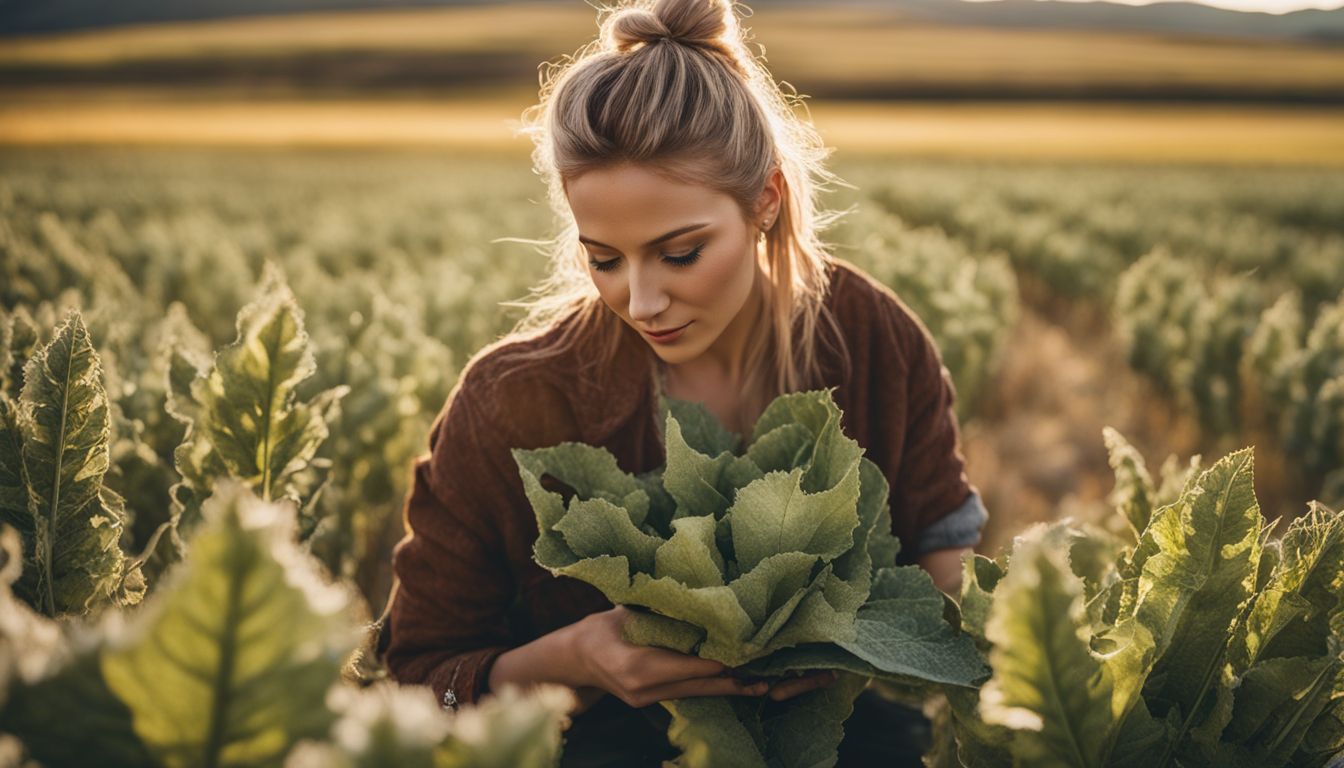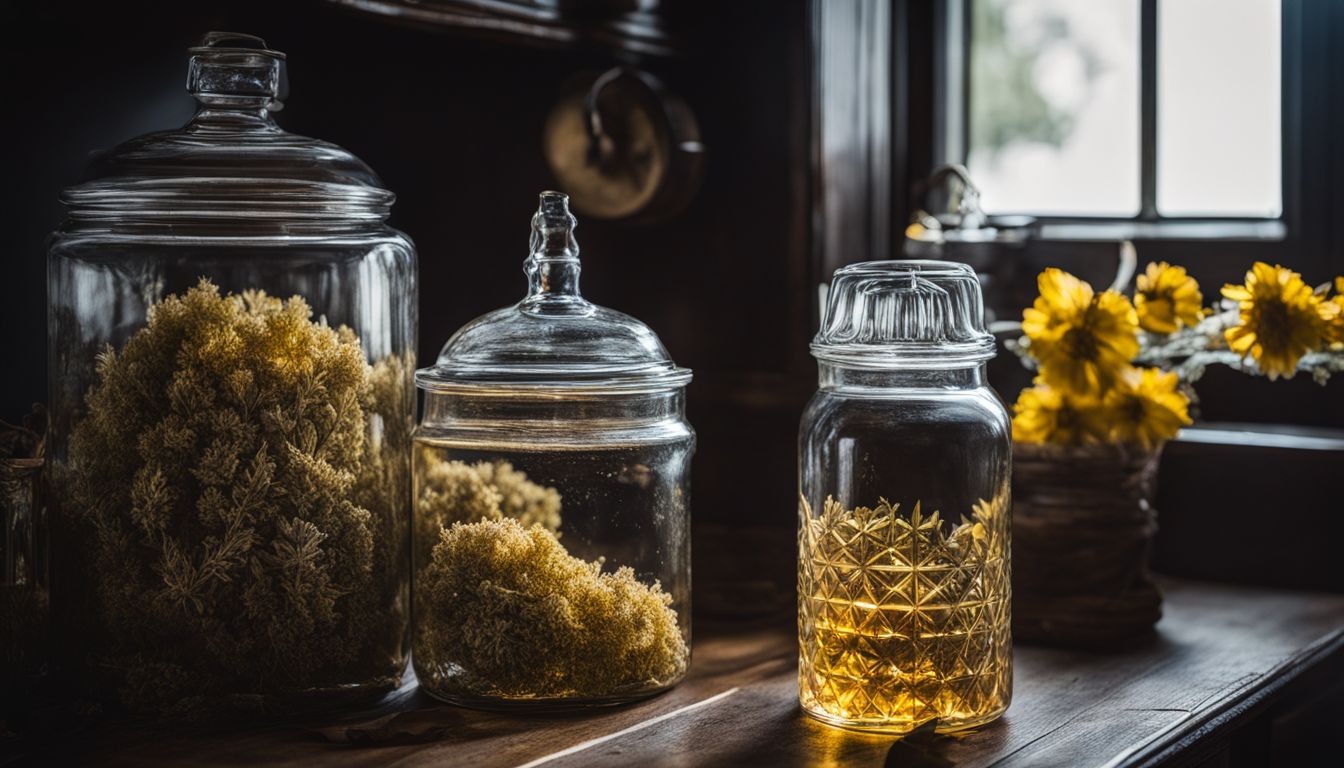TheHerbProf.com is a treasure trove of knowledge for those interested in natural healing and herbal remedies. The website is run by Paul Johnston MD. A naturopathic who has not only received extensive education in the field but also has personal experience in self-healing.
Are you tired of stubborn coughs and colds that just won’t quit? Mullein, a natural herb used for centuries, might hold the key to easing your respiratory woes. This blog will show you how to create a simple mullein tincture at home, tapping into the plant’s renowned medicinal benefits for better health. Discover the healing powers of this Mullein Tincture Recipe, the ancient remedy.
What is Mullein and its Medicinal Benefits?

Mullein has been used as an herbal remedy for centuries, with common uses including respiratory issues like bronchitis and pneumonia, as well as potential benefits for bladder health and quitting smoking.
Known as an herbal remedy for centuries
For hundreds of years, people have turned to mullein for its powerful healing properties. This plant has been a staple in traditional folk medicine, revered for its ability to soothe and support the respiratory system.
Its leaves and flowers contain active compounds like saponins and flavonoids that are believed to reduce inflammation and fight infections. In the realm of medical herbalism, extracts from this versatile herb have been used to address ailments ranging from bronchitis to earaches.
Healers throughout history have praised mullein’s virtues, often using it as a first line of defense against coughs and colds. Today’s herbalists continue this tradition by preparing tinctures and decoctions aimed at bolstering lung health.
These ancient practices form the foundation for modern usage, inspiring countless individuals seeking natural ways to promote wellness. As we explore more about mullein’s benefits, let’s delve into how you can harness its medicinal qualities through making your own mullein tincture.
Commonly used for respiratory issues
Mullein’s longstanding use as an herbal remedy has made it a go-to plant for addressing respiratory challenges. The leaves and flowers contain saponins and glycosides, compounds that can help soothe the throat and ease breathing.
People have traditionally turned to mullein leaf tincture to relieve symptoms of colds, coughs, bronchitis, and asthma due to its expectorant properties – it helps clear mucus from the lungs.
As a versatile component in herbal medicine, mullein offers relief not just as a tincture but also when prepared as tea or used in steam inhalations. Its gentle action on the mucous membranes makes it suitable for many looking for natural health solutions.
By using methods like the folk method similar strains can be minimized while achieving maximum wellness benefits from this powerful plant ally.
Other potential uses
Mullein tincture goes beyond supporting lung health and finds its place in soothing earaches when turned into an oil. Experts recommend using mullein flower or leaf extract to create this remedy for a natural approach to ear discomfort.
This versatile plant also helps with skin conditions like eczema, as its anti-inflammatory properties can calm irritated skin.
As a holistic herbal product, mullein can be crafted into drops that deal with pesky cold sores. These extracts harness the power of mountain rose herbs’ saponins and glycosides, targeting inflammation right at the source.
Next up, let’s dive into how you can make your own mullein tincture at home with some simple ingredients and easy-to-follow steps.
How to Make Mullein Tincture

To make mullein tincture, you will need dried mullein, 80- or 100-proof vodka, a glass jar with a lid, and a dark place to store the tincture while it steeps.
Ingredients needed
To make mullein tincture, you will need dried mullein leaves and flowers, alcohol (such as vodka or brandy), a clean glass jar with a tight-fitting lid, and cheesecloth or a fine mesh strainer.
The dried mullein should be thoroughly dried to prevent moisture from affecting the tincture.
Airtight containers like amber glass bottles are ideal for storing the tincture once it’s made. Glycerin can also be used as an alternative to alcohol for those who prefer a non-alcoholic option.
Step-by-step instructions
To make mullein tincture, you will need the following ingredients. After gathering these items, follow the step-by-step instructions below:
- Dried mullein leaves and flowers
- High – proof alcohol (such as vodka or brandy)
- Glass jar with a tight – fitting lid
- Cheesecloth or fine mesh strainer
- Amber glass dropper bottles
Other Ways to Use Mullein for Health Benefits
Brew a soothing cup of mullein tea by steeping dried leaves in hot water, or try using mullein extract to support bladder health and even help with smoking cessation.
Mullein tea recipe
To make Mullein tea, follow these steps:
- Grind dried Mullein leaves and flowers into a coarse powder.
- Boil water in a pot and remove from heat.
- Add 1 – 2 teaspoons of the ground Mullein to a tea infuser or directly to the hot water.
- Allow the mixture to steep for 10 – 15 minutes, covered.
- Strain the tea to remove the solid particles using a fine mesh strainer or cheesecloth.
- Sweeten with honey or any preferred sweetener if desired.
- Serve the Mullein tea warm and enjoy its potential respiratory and overall health benefits.
Mullein and bladder health
Mullein has also been traditionally used to support bladder health. The herb is believed to have diuretic properties that may help in promoting healthy urinary function. Additionally, mullein’s soothing and anti-inflammatory qualities are thought to benefit the urinary system by reducing discomfort and inflammation.
Mullein can be consumed as a tea or tincture to potentially support overall bladder wellness.
If you’re interested in harnessing the potential benefits of mullein for bladder health, there are various methods such as steeping its leaves in hot water or preparing a tincture using alcohol or apple cider vinegar and consuming it accordingly.
Mullein for stopping smoking
To use mullein for stopping smoking, consider incorporating it as a supportive herb in your transition to quitting. The plant’s soothing properties can help alleviate respiratory discomfort during the early stages of smoking cessation.
Mullein can be used in various forms such as teas or tinctures to support lung health and ease withdrawal symptoms. By including mullein in your wellness routine, you may experience its potential benefits for alleviating the urge to smoke while promoting overall respiratory well-being.
Remember that lifestyle changes, including professional guidance and support systems, are essential when making significant adjustments like quitting smoking.
Safety Precautions and Potential Side Effects of Mullein Tincture
It’s important to be aware of potential interactions, precautions, and risks associated with mullein tincture. Read on to ensure safe use for your health needs.
Possible Interactions
Some medications may interact with mullein tincture, so it’s crucial to consult a healthcare professional before using it, especially if you are taking any prescription drugs. Mullein could potentially interact with blood-thinning medications, increasing the risk of bleeding.
Also, there is a possibility of interaction with sedatives or CNS depressants due to the calming effects of mullein. It’s essential to be aware of these potential interactions and seek professional advice.
Mullein contains compounds that could impact certain liver enzymes affecting drug metabolism. This means that the effectiveness of some medications might be altered when taken alongside mullein tincture.
Precautions when using mullein internally
Before using mullein internally, it is important to take certain precautions. If you have a known allergy or sensitivity to plants in the Scrophulariaceae family, such as snapdragons, plantains, or figworts, it’s best to avoid internal use of mullein.
Additionally, individuals with existing medical conditions or those taking prescription medications should consult a healthcare professional before using mullein internally.
Furthermore, pregnant and breastfeeding individuals should also seek medical advice before consuming mullein tincture or any other form of internal mullein preparation due to the lack of sufficient safety data in these populations.
Risks for certain populations
Mullein tincture may not be suitable for everyone. Individuals with known allergies to plants in the Scrophulariaceae family should avoid using mullein tincture, as it could trigger allergic reactions.
Pregnant and breastfeeding women should also exercise caution when using mullein tincture, as there is insufficient evidence regarding its safety during these periods. Moreover, individuals with existing liver conditions should consult a healthcare professional before using mullein tincture due to its alcohol content which may exacerbate liver problems.
It’s important to consider potential risks and precautions associated with mullein tincture use, especially for those in specific populations or health conditions. Understanding these factors can help individuals make informed decisions about whether this herbal remedy is suitable for their unique circumstances.
Before You Go – Mullein Tincture Recipe
Crafting your mullein tincture offers an opportunity to harness its medicinal properties. Following the step-by-step process and safety precautions is crucial for a potent final product.
Exploring various ways to use mullein enhances its versatility as a herbal remedy. Understanding the potential side effects ensures responsible usage of this natural preparation.
Mullein Tincture Recipe and theherbprof.com: A Healing Harmony
When you’re on a quest for natural wellness, a Mullein Tincture Recipe is your herbal hero. It’s like a healing elixir, distilling the potent properties of mullein into a concentrated tincture. Need a respiratory aid? Mullein Tincture Recipe. Looking for a natural anti-inflammatory? Mullein Tincture Recipe. Want a herbal remedy? You’ve got it, it’s Mullein Tincture Recipe!
Now, let’s talk about theherbprof.com. It’s your digital apothecary, the portal that opens up a world of herbal remedies. It’s packed with information about the Mullein Tincture Recipe and how to prepare it effectively.
Here’s the beautiful part: Mullein Tincture Recipe and theherbprof.com are a dream team. The recipe provides the healing tincture, and the website provides the practical know-how to create that tincture. It’s a match made in herbal heaven!
So, the next time you’re on a quest for natural wellness, remember this healing harmony. Visit theherbprof.com, whip up that Mullein Tincture Recipe, and embark on your journey to wellness! Let the healing begin!
References – Mullein Tincture Recipe
Little Herb Encyclopedia, by Jack Ritchason; N.D., Woodland Publishing Incorporated, 1995
The Ultimate Healing System, Course Manual, Copyright 1985, Don Lepore
Planetary Herbology, Michael Tierra, C.A., N.D., Lotus Press, 1988
Handbook of Medicinal Herbs, by James A. Duke, Pub. CRP Second Edition 2007
The Complete Medicinal Herbal, by Penelope Ody, Published by Dorling Kindersley
Check the Following Articles!
Herbal Mint Tea Recipe: A Refreshing Beverage
Butterfly Pea Flower Recipe: A Colorful Drink
Recipe for Lavender Tea: Quick Drink To Relax
FAQs – Mullein Tincture Recipe
1. What is a mullein tincture?
A mullein tincture is a type of herbal preparation made by soaking the leaves or flowers of the mullein plant in alcohol to extract its beneficial properties.
2. How do you make a mullein tincture?
To make a mullein tincture, fill a jar with dried mullein leaves or flowers and cover it with alcohol, like vodka or brandy. Let it sit for several weeks, shaking it daily; then strain out the plant parts to use the liquid.
3. What are the benefits of using aromatic herbs like mullein in a tincture?
Using aromatic herbs like mullein in your homemade preparations can offer soothing effects on your body while enjoying their pleasant natural scents.
4. Can I use fresh mullein to create a tincture?
Yes, you can use fresh mullein plants for your recipes; just be sure to chop them finely before covering them with alcohol and follow the same steps as when using dried herbs.


